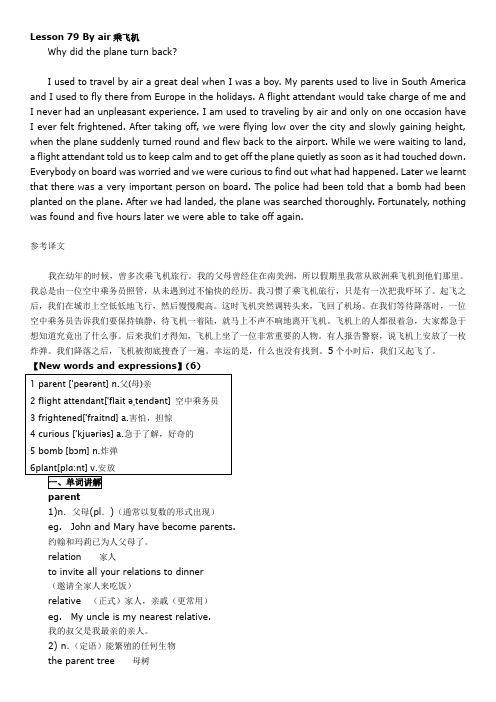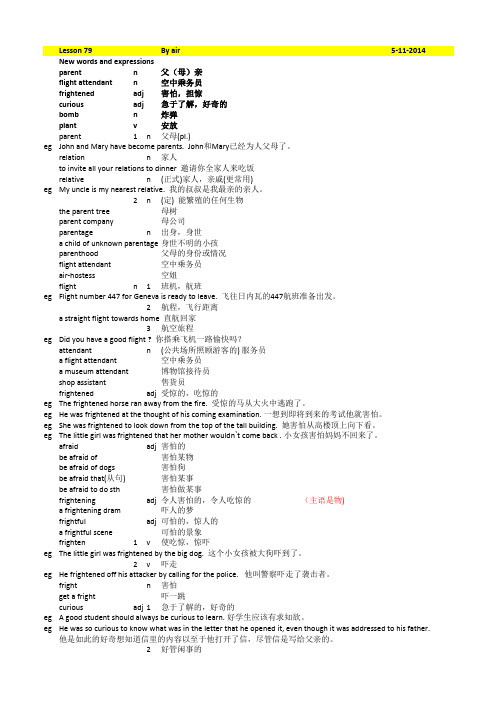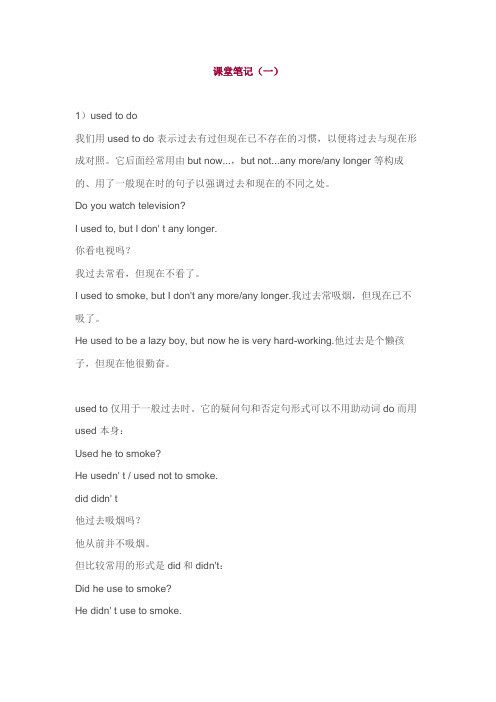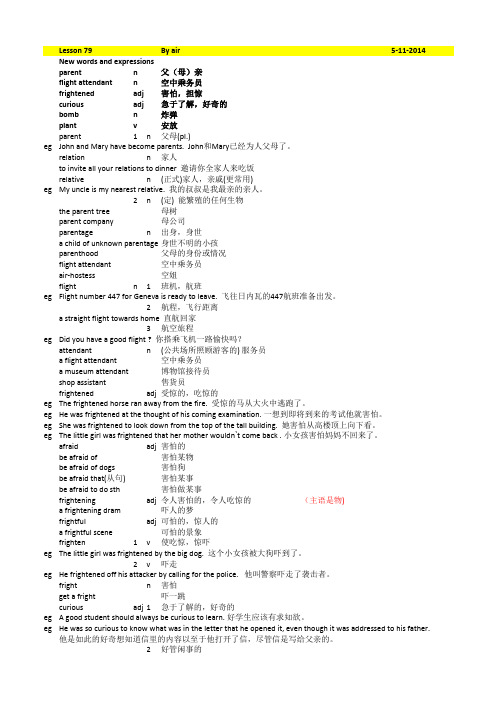新概念英语第二册笔记-第79课电子教案
(完整word版)裕兴新概念英语第二册笔记第79课

Lesson 79 By air乘飞机Why did the plane turn back?I used to travel by air a great deal when I was a boy. My parents used to live in South America and I used to fly there from Europe in the holidays. A flight attendant would take charge of me and I never had an unpleasant experience. I am used to traveling by air and only on one occasion have I ever felt frightened. After taking off, we were flying low over the city and slowly gaining height, when the plane suddenly turned round and flew back to the airport. While we were waiting to land, a flight attendant told us to keep calm and to get off the plane quietly as soon as it had touched down. Everybody on board was worried and we were curious to find out what had happened. Later we learnt that there was a very important person on board. The police had been told that a bomb had been planted on the plane. After we had landed, the plane was searched thoroughly. Fortunately, nothing was found and five hours later we were able to take off again.参考译文我在幼年的时候,曾多次乘飞机旅行。
裕兴新概念英语第二册笔记第79课课文讲解

Lesson 795-11-2014New words and expressions parent n 父(母)亲flight attendant n 空中乘务员frightened adj 害怕,担惊curious adj 急于了解,好奇的bomb n 炸弹plant v 安放parent 1n 父母(pl.)egJohn and Mary have become parents. John 和Mary 已经为人父母了。
relation n 家人to invite all your relations to dinner 邀请你全家人来吃饭relative n (正式)家人,亲戚(更常用)egMy uncle is my nearest relative. 我的叔叔是我最亲的亲人。
2n (定) 能繁殖的任何生物the parent tree 母树parent company 母公司parentage n 出身,身世a child of unknown parentage 身世不明的小孩parenthood 父母的身份或情况flight attendant 空中乘务员air-hostess 空姐flight n 1班机,航班egFlight number 447 for Geneva is ready to leave. 飞往日内瓦的447航班准备出发。
2航程,飞行距离a straight flight towards home 直航回家3航空旅程egDid you have a good flight ? 你搭乘飞机一路愉快吗?attendant n (公共场所照顾游客的) 服务员a flight attendant 空中乘务员a museum attendant 博物馆接待员shop assistant 售货员frightened adj 受惊的,吃惊的egThe frightened horse ran away from the fire. 受惊的马从大火中逃跑了。
新概念第二册Lesson 79 By air讲义

新概念第二册Lesson 79 By air一、单词精讲parent ['peərənt]n.父(母)亲引申:可引申为根源、起源,如“Necessity is the parent of invention.”(需要是发明之母)。
搭配:single parent(单亲);parent company(母公司);parent - child relationship(亲子关系)。
例句:My parents are very strict with me.(我的父母对我非常严格。
)flightattendant['flait əˌtendənt] 空中乘务员引申:可引申为航空服务人员的代表形象,在航空安全宣传等方面作为一种职业标识。
搭配:experienced flight attendant(有经验的空中乘务员);flight attendant uniform(空中乘务员制服)。
例句:The flight attendant served us delicious meals.(空中乘务员为我们提供了美味的餐食。
)词源:“flight”来自古英语“flyht”,表示飞行;“attendant”源自拉丁语“attendere”,意为照顾、侍候,组合起来表示在空中飞行的飞机上照顾乘客的人员。
frightened['fraitnd]a.害怕,担惊引申:可引申为使人惊恐的状态或氛围,如“a frightened silence”(一种惊恐的沉默)。
搭配:be frightened of(害怕……);frightened look(惊恐的表情)。
例句:The little girl was frightened of the dog.(小女孩害怕那只狗。
)词源:“frighten”源自古英语“fyrhto”,表示恐惧,加上- ed表示形容词形式。
curious['kjuəriəs] a.急于了解,好奇的引申:可引申为奇特的、古怪的,如“a curious object”(一个奇特的物体)。
新概念英语第二册79课课后习题详细答案(共5篇)

新概念英语第二册79课课后习题详细答案(共5篇)第一篇:新概念英语第二册79课课后习题详细答案新概念英语第二册课后习题答案详解Lesson 79 练习答案 Key to written exercises 1.关键句型练习答案A What happened: never had(1.4);turned round(1.7);flew back(1.7);told(1.8);learnt(1.10);was searched(1.11);was found(1.12);were able to take off(1.12)What was happening: were flying(1.6);and slowly gaining(1.6);were waiting(1.8)What used to/would happen: used to travel(1.1);used to live(1.2);used to fly(1.2);would take charge(1.3)C(sample answers)1 In the past(but not now),I habitually flew there from Europe in the holidays.2 I am accustomed to travelling by air now(because I have done it many times).2.难点练习答案over 2 off 3 in 4 up…up 5 after 6 off 7down 8 off 3.多项选择题答案1.b 根据课文第6-7行,只有b.与课文情形相符合,而其他3个选择都与课文内容不符,所以只能选b.2.d 根据课文第11行,只有d.there was fear of an explosion(爆炸)是课文所暗示的情况,并能说明飞机返回的原因,而其他3个选择虽然都是课文所提及的内容,但不是飞机返回的原因,所以应该选d.3.c e to travel 语法错误;ed to travel 指过去经常性的动作,而本句的时间状语是today,表示现在,因此不能用used to;d.am used to traveling(习惯于旅行)可以表示现在的情况,但与前一句没有逻辑关系,不符合题目意思;只有c.travel 是一般现在时,可以表示现在经常性动作,最符合题目意思和语法,所以选c.4.c 本句需要一个同前一句的a great deal(很多)意义相同的词或词组.a.very many(非常多)只能修饰可数名词,而不能修饰动词.b.a great number(很多)也不能修饰动词.d.lots(很多)常跟of 连用,修饰可数名词.这3个选择都不能替换前一句的a great deal,只有c.a lot 与 a great deal 意思等同,并且可以修饰动词.5.a 本句是一个疑问句,需要一个适合的表示时间的疑问词,以便使它同后面的回答Since I was a boy(自从我幼年时)的意义相吻合。
新概念二第79课笔记

课堂笔记(一)1)used to do我们用used to do 表示过去有过但现在已不存在的习惯,以便将过去与现在形成对照。
它后面经常用由but now...,but not...any more/any longer 等构成的、用了一般现在时的句子以强调过去和现在的不同之处。
Do you watch television?I used to, but I don' t any longer.你看电视吗?我过去常看,但现在不看了。
I used to smoke, but I don't any more/any longer.我过去常吸烟,但现在已不吸了。
He used to be a lazy boy, but now he is very hard-working.他过去是个懒孩子,但现在他很勤奋。
used to 仅用于一般过去时。
它的疑问句和否定句形式可以不用助动词do 而用used 本身:Used he to smoke?He usedn' t / used not to smoke.did didn' t他过去吸烟吗?他从前并不吸烟。
但比较常用的形式是did和didn't:Did he use to smoke?He didn' t use to smoke.他过去吸烟吗?他从前不吸烟。
在针对used to提问时,一般也用didI used to be a good swimmer.Did you really? I didn' t even know you could swim.Did you use to smoke?Yes, I did / used to.我过去是个游泳好手。
真的吗?我以前甚至不知道你会游泳。
你从前吸烟吗?是的,我吸。
would 是另一个用于描述过去经常性行为的词,它与used to有时可以互换,有时则不可以,而且would 需要指出具体时间,used to 则不需要。
裕兴新概念英语第二册笔记_第79课_课文讲解

Lesson 795-11-2014New words and expressions parent n 父(母)亲flight attendant n 空中乘务员frightened adj 害怕,担惊curious adj 急于了解,好奇的bomb n 炸弹plant v 安放parent 1n 父母(pl.)egJohn and Mary have become parents. John 和Mary 已经为人父母了。
relation n 家人to invite all your relations to dinner 邀请你全家人来吃饭relative n (正式)家人,亲戚(更常用)egMy uncle is my nearest relative. 我的叔叔是我最亲的亲人。
2n (定) 能繁殖的任何生物the parent tree 母树parent company 母公司parentage n 出身,身世a child of unknown parentage 身世不明的小孩parenthood 父母的身份或情况flight attendant 空中乘务员air-hostess 空姐flight n 1班机,航班egFlight number 447 for Geneva is ready to leave. 飞往日内瓦的447航班准备出发。
2航程,飞行距离a straight flight towards home 直航回家3航空旅程egDid you have a good flight ? 你搭乘飞机一路愉快吗?attendant n (公共场所照顾游客的) 服务员a flight attendant 空中乘务员a museum attendant 博物馆接待员shop assistant 售货员frightened adj 受惊的,吃惊的egThe frightened horse ran away from the fire. 受惊的马从大火中逃跑了。
新概念二第79课笔记
课堂笔记(一)1)used to do我们用used to do 表示过去有过但现在已不存在的习惯,以便将过去与现在形成对照。
它后面经常用由but now...,but not...any more/any longer 等构成的、用了一般现在时的句子以强调过去和现在的不同之处。
Do you watch television?I used to, but I don' t any longer.你看电视吗?我过去常看,但现在不看了。
I used to smoke, but I don't any more/any longer.我过去常吸烟,但现在已不吸了。
He used to be a lazy boy, but now he is very hard-working.他过去是个懒孩子,但现在他很勤奋。
used to 仅用于一般过去时。
它的疑问句和否定句形式可以不用助动词do 而用used 本身:Used he to smoke?He usedn' t / used not to smoke.did didn' t他过去吸烟吗?他从前并不吸烟。
但比较常用的形式是did和didn't:Did he use to smoke?He didn' t use to smoke.他过去吸烟吗?他从前不吸烟。
在针对used to提问时,一般也用didI used to be a good swimmer.Did you really? I didn' t even know you could swim.Did you use to smoke?Yes, I did / used to.我过去是个游泳好手。
真的吗?我以前甚至不知道你会游泳。
你从前吸烟吗?是的,我吸。
would 是另一个用于描述过去经常性行为的词,它与used to有时可以互换,有时则不可以,而且would 需要指出具体时间,used to 则不需要。
新概念英语第2册课程讲义Lesson79
Lesson 79 单词讲解1. frightened adj. 害怕,担惊frighten v. 使害怕,吓唬fright n. 害怕2. curious adj. 急于了解,好奇的奇怪的be curious about …be curious to do sth.curiosity n. 好奇心3. bomb n. 炸弹bomber n. 轰炸机4. plant v. 安放种植plant treesplant a bombLesson 79 课文&语法讲解Key points: used to do sth.be used to doing sth.倒装句Review:一般过去时/过去进行时1. I used to travel by air … when I was a boy.2. My parents used to live in South America and I used to fly there from Europe ...used to do sth. 过去常常做某事3. A flight attendant would take charge of me and ...would do sth.take charge of …4. I am used to travelling by air and …be used to doing sth. / sth. 习惯于做某事/某事My friend is used to swimming in winters. He is used tosleeping during the daytime.get used to …be/get accustomed to …5. …and only on one occasion have I ever felt frightened.I have ever felt frightened only on one occasion.倒装句部分倒装What?How?When?部分倒装1. You will never know the truth.Never _________________.2. He cares little for my words.Little ________________.部分倒装3. I had no sooner got the invitation than I refused.No sooner ______________.4. He had hardly had time to settle down when he left the country.Hardly _________________.部分倒装5. We can learn English well only in this way.Only in this way __________.6. He achieved his goal only by working hard.Only by working hard ______.6. After taking off, we were flying low over the city and slowly gaining height, …we were flying low … and (we were) gaining height7. …when the plane suddenly turned round and flew back to the airport.the plane turned round and (the plane) flew back…8. While we were waiting to land, a flight attendant told us to keep calm and to get off the plane quietly ...a flight attendant told us to keep calmand (a flight attendant told us) to get off9. Everybody on board was worried and we were curious to find out what had happened.on boardbe curious to do sth.what had happened 宾语从句10. The police had been told that a bomb had been planted on the plane.that a bomb had been planted …宾语从句had been done过去完成时的被动语态Lesson 79 知识拓展People have always been ______ about exactly how life on earth began.A. curiousB. excitedC. anxiousD. careful( 天津5)Only after Mary read her composition the second time ______ the spelling mistake.A. did she noticeB. she noticedC. does she noticeD. she has noticed( 天津6)Only after Mary read her composition the second time ______ the spelling mistake.A. did she noticeB. she noticedC. does she noticeD. she has noticed( 天津6)Only when he reached the tea-house ______ it was the same place he’d been in last year.A. he realizedB. he did realizeC. realized heD. did he realize( 课标全国28)Only when he reached the tea-house ______ it was the same place he’d been in last year.A. he realizedB. he did realizeC. realized heD. did he realize( 课标全国28)Only with the greatest of luck ______ to escape from the rising flood waters.A. managed sheB. she managedC. did she manageD. she did manage( 上海29)Only with the greatest of luck ______ to escape from the rising flood waters.A. managed sheB. she managedC. did she manageD. she did manage( 上海29)Never before ______ seen anybody who can play tennis as well as Robert.A. had sheB. she hadC. has sheD. she has( 江西32)Never before ______ seen anybody who can play tennis as well as Robert.A. had sheB. she hadC. has sheD. she has( 江西32)Not until he retired from teaching three years ago ______ having a holiday abroad.A. he had consideredB. had he consideredC. he consideredD. did he consider( 辽宁32)Not until he retired from teaching three years ago ______ having a holiday abroad.A. he had consideredB. had he consideredC. he consideredD. did he consider( 辽宁32)。
新概念二册 第79课 By air(共25张PPT)
• After taking off, we were flying low over the city and slowly gaining height, when the plane suddenly turned round and flew back to the airport.
• take off 起飞 • gain height (飞机)增加高度,爬高 • 当车出城之后,开始加速
9、 有 时 候 读 书是一 种巧妙 地避开 思考的 方法。 21.8.521.8.5Thursday, August 05, 2021 10、 阅 读 一 切 好书 如同和 过去最 杰出的 人谈话 。20:13:4020:13:4020:138/5/2021 8:13:40 PM
11、 越 是 没 有 本领 的就越 加自命 不凡。 21.8.520:13:4020:13Aug-215-Aug-21 12、 越 是 无 能 的人 ,越喜 欢挑剔 别人的 错儿。 20:13:4020:13:4020:13Thursday, August 05, 2021 13、 知 人 者 智 ,自 知者明 。胜人 者有力 ,自胜 者强。 21.8.521.8.520:13:4020:13:40August 5, 2021 14、 意 志 坚 强 的人 能把世 界放在 手中像 泥块一 样任意 揉捏。 2021年 8月5日 星期四 下午8时 13分40秒 20:13:4021.8.5 15、 最 具 挑 战 性的 挑战莫 过于提 升自我 。。2021年 8月 下午8时 13分 21.8.520:13August 5, 2021 16、 业 余 生 活 要有 意义, 不要越 轨。2021年 8月 5日星 期四8时 13分40秒 20:13:405 August 2021 17、 一 个 人 即 使已 登上顶 峰,也 仍要自 强不息 。下午 8时13分 40秒下 午8时 13分20:13:4021.8.5
新概念英语第二册Lesson79_81学习笔记
新概念英语第二册Lesson79~81学习笔记新概念英语第二册Lesson79学习笔记1. I used to travel by air a great deal when I was a boy.我在幼年的时候,曾多次乘飞机旅行。
①used to +do 表示过去常常做某事,而be used to +doing 则表示习惯做某事。
②by+交通工具这个也是一个很常见的用法,表示乘坐某某工具。
③a great deal 表示很多,大量。
如果修饰名词则为a great deal of+n,这里名词则为不可数名词。
You have spent a great deal of time and effort on this project, I believe you will succeed.你在这个项目上花了大量时间和心血,我相信你会成功的。
④这个句子是一个时间状语从句。
when引导的时间状语从句的谓语动词可以是延续性动词,也可以是瞬时动词,有时when就表示“就在那时”。
如:When I studied in the library, She called me.我在图书馆学习的时候她给我来电话了。
2. take charge of 照管,负责,担任in charge of 管理,负责照料 in the charge of 由……照顾Don't worry, I will take charge of the baby when you are away.别担心,你不在的时候我会照顾好孩子的。
3. After taking off, we were flying low over the city and slowly gaining height, when the plane suddenly turned round and flew back to the airport.起飞之后,我们在城市上空低低地飞行,然后慢慢爬高。
- 1、下载文档前请自行甄别文档内容的完整性,平台不提供额外的编辑、内容补充、找答案等附加服务。
- 2、"仅部分预览"的文档,不可在线预览部分如存在完整性等问题,可反馈申请退款(可完整预览的文档不适用该条件!)。
- 3、如文档侵犯您的权益,请联系客服反馈,我们会尽快为您处理(人工客服工作时间:9:00-18:30)。
Lesson 79 By Air?【Text】I used to travel by air a great deal when I was a boy. My parents used to live in South America and I used to fly there from Europe in the holidays. A flight attendant would take charge of me and I never had an unpleasant experience. I am used to traveling by air and only on one occasion have I ever felt frightened. After taking off, we were flying low over the city and slowly gaining height, when the plane suddenly turned round and flew back to the airport. While we were waiting to land, a flight attendant told us to keep calm and to get off the plane quietly as soon as it had touched down. Everybody on board was worried and we were curious to find out what had happened. Later we learnt that there was a very important person on board. The police had been told that a bomb had been planted on the plane. After we had landed, the plane was searched thoroughly. Fortunately, nothing was found and five hours later we were able to take off again.【课文翻译】我在幼年的时候,曾多次乘飞机旅行。
我的父母曾经住在南美洲,所以假期里我常从欧洲乘飞机到他们那里。
我总是由一位空中乘务员照管,从未遇到过不愉快的经历。
我习惯了乘飞机旅行,只是有一次把我吓坏了。
起飞之后,我们在城市上空低低地飞行,然后慢慢爬高。
这时飞机突然调转头来,飞回了机场。
在我们等待降落时,一位空中乘务员告诉我们要保持镇静,待飞机一着陆,就马上不声不响地离开飞机。
飞机上的人都很着急,大家都急于想知道究竟出了什么事。
后来我们才得知,飞机上坐了一位非常重要的人物。
有人报告警察,说飞机上安放了一枚炸弹。
我们降落之后,飞机被彻底搜查了一遍。
幸运的是,什么也没有找到。
5个小时后,我们又起飞了。
New words and expressions 生词和短语1. parent1) n 父母(pl.)eg: John and Mary have become parents.John和Mary已经为人父母了。
词汇拓展:relation n 家人to invite all your relations to dinner 邀请你全家人来吃饭relative n (正式)家人,亲戚(更常用)eg My uncle is my nearest relative. 我的叔叔是我最亲的亲人。
2)n (定) 能繁殖的任何生物the parent tree 母树parent company 母公司parentage n 出身,身世a child of unknown parentage 身世不明的小孩parenthood 父母的身份或情况2. flight attendant 空中乘务员air-hostess 空姐flight1)班机,航班eg:Flight number 447 for Geneva is ready to leave.飞往日内瓦的447航班准备出发。
2)航程,飞行距离a straight flight towards home 直航回家3)航空旅程eg:Did you have a good flight ? 你搭乘飞机一路愉快吗?(公共场所照顾游客的) 服务员attendant na flight attendant 空中乘务员a museum attendant 博物馆接待员shop assistant 售货员3. frightened adj 受惊的,吃惊的eg:The frightened horse ran away from the fire.受惊的马从大火中逃跑了。
eg:He was frightened at the thought of his coming examination.一想到即将到来的考试他就害怕。
eg:She was frightened to look down from the top of the tall building.她害怕从高楼顶上向下看。
eg:The little girl was frightened that her mother wouldn`t come back .小女孩害怕妈妈不回来了。
区别afraid adj 害怕的be afraid of 害怕某物be afraid of dogs 害怕狗be afraid that(从句) 害怕某事be afraid to do sth 害怕做某事frightening adj 令人害怕的,令人吃惊的(主语是物)a frightening dram 吓人的梦frightful adj 可怕的,惊人的a frightful scene 可怕的景象frighten1)v 使吃惊,惊吓eg:The little girl was frightened by the big dog.这个小女孩被大狗吓到了。
2)v 吓走eg:He frightened off his attacker by calling for the police.他叫警察吓走了袭击者。
fright n 害怕get a fright 吓一跳4.curious1)急于了解的,好奇的eg:A good student should always be curious to learn.好学生应该有求知欲。
eg:He was so curious to know what was in the letter that he opened it,even though it was addressed to his father.他是如此的好奇想知道信里的内容以至于他打开了信,尽管信是写给父亲的。
2)好管闲事的eg:My neighbors are very curious.我的邻居们非常爱管闲事。
curiosity n 好奇,好奇心out of curiosity 出于好奇eg:The boy burned with a curiosity to know what was in the letter addressed to his mother.这个孩子极想知道写给妈妈的信里的内容。
5.bomb1)n 炸弹形近词:comb 梳子plant a bomb in the post office 在邮局安放一枚炸弹2)原子弹eg:Has that county got the bomb?那个国家有原子弹吗?习语:go like a bomb (指交通工具)行进快速,疾驶eg:My new car goes like bomb.我的新车行进非常快。
spend a bomb/ cost a bomb 花了许多钱bomber n 轰炸机fighter n 战斗机6. plant1)v 安放eg:He planted himself in a chair by the fire.他稳坐在炉火边的椅子上。
plant oneself (安放自己=稳坐)eg: He planted a knife in her back.他在他的背上插了一刀。
2) v 种植eg: April is the time to plant.四月是种植的时间。
3) v 播种,培植eg: The hillside was planted with trees.山坡上被种满了树。
4) n 植物eg: All plants need water and light.所有的植物都需要水和阳光。
5) n 工厂eg: They`ve just built a new chemical plant.他们刚刚兴建一所化学厂。
【课文讲解】1. I used to travel by air a great deal when I was a boy. My parents used to live in SouthAmerica and I used to fly there from Europe in the holidays.①used to do我们用used to do表示过去有过但现在已不存在的习惯,以便将过去与现在形成对照。
它后面经常用由but now...,but not...any more/any longer 等构成的、用了一般现在时的句子以强调过去和现在的不同之处。
eg: -Do you watch television?- I used to, but I don' t any longer.- 你看电视吗?- 我过去常看,但现在不看了。
eg: I used to smoke, but I don't any more/any longer.我过去常吸烟,但现在已不吸了。
eg: He used to be a lazy boy, but now he is very hard-working.他过去是个懒孩子,但现在他很勤奋。
在针对used to提问时,一般也用dideg: -I used to be a good swimmer.- Did you really? I didn't even know you could swim.- Did you use to smoke?- Yes, I did / used to.- 我过去是个游泳好手。
- 真的吗?我以前甚至不知道你会游泳。
